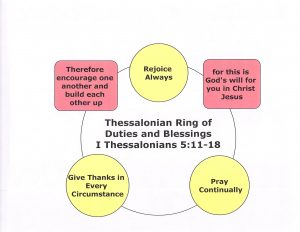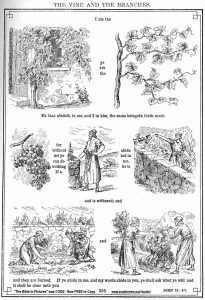
The year 2020 has brought many people to their knees. Some people were driven to the edge of despair and dropped to their knees out of utter frustration and sheer exasperation. Others bowed before God, praying for mercy and deliverance. It is a year that found many people sore pressed to be encouraged. It was a year of little joy or thankfulness.
In three short verses, Paul delivers a forceful message in his first letter to the Thessalonica church. His lesson is a powerful message that is just as apropos to today’s world as to his world. Although his injunctions are robust in meaning and potential, they are also a simple salvo of three resolute commands. Taken together with the rationale of fulfilling God’s will, they are an unassailable combination of the necessary and important traits and directives on how to live a righteous life.
Rejoice always, pray continually, give thanks in all circumstances; for this is God’s will for you in Christ Jesus. (I Thessalonians 5:16-18, NIV)
These commands are not only the duties that God has assigned His children. They are also a source of blessings. As Christians, individually and corporately, fulfill these responsibilities, the completed duties form a self-sustaining cycle that builds and feeds others in the ring.
Paul closes his letter to the church at Thessalonica with a set of instructions on how to live the Christian life. He begins this section by attempting to motivate his readers to encourage and build up each other. He praises and reaffirms what they are already doing.
Therefore encourage one another and build each other up, just as in fact you are doing. (I Thessalonians 5:11, NIV)

Paul closes this section by providing the best rationale a Christian could have to fulfill the prescribed duties.
…for this is God’s will for you in Christ Jesus. (I Thessalonians 5:18b, NIV)
I want to look at each of the three duties of Christians, highlighted in these verses as my Thanksgiving lesson for 2020. I will consider them in three separate posts in the order Paul presents them.
1. Rejoice Always

I do not think that Paul is talking about a frolicking, dancing in the street type of joy. This is very apparent when you look at the opening of James’ letter to the Jewish Christians scattered all over the known world. James suggests that we consider troubles of any kind an opportunity to “consider it an opportunity for GREAT joy,” or “count it all joy,” as other translations phrase it.
Dear brothers and sisters, when troubles of any kind come your way, consider it an opportunity for great joy. (James 1:2, NLT)
Biblical joy is not a euphoric emotion. It is more like a calm sense of peace and assurance. It is a peace that comes from knowing that God is working in our lives when we face trials or troubles. The assurance comes from understanding that God has a purpose in all that happens.
Paul, in his letter to the church in Rome, reminds them:
And we know that all things work together for good to them that love God, to them who are the called according to his purpose. (Romans 8:28, KJV)

A perpetual state of any rejoicing is in itself humanly impossible. The year 2020 has not been a year of rejoicing for most of the world. As we near the end of 2020, a year that many people have called a natural disaster. The Covid Pandemic may be the worse health crisis globally since the black plague of the 14th century, estimated to have killed 25 million people, which was more than one-third of the world’s population.
In 2020, more than 67 million people have been inflicted with the virus, with more than 1.5 million deaths from covid-related causes. There is no predictable end in sight. Some medical experts predict communities will be hit with second and third spikes in the number of cases and deaths. Many commentators have declared 2020 to be a “God-forsaken year.”
Throughout the history of humanity, many civilizations have experienced what they described as being abandoned by God. Habakkuk, the Old Testament prophet, cried to God in the midst of one of those periods in Israel’s history.
How long, O Lord, must I call for help? But you do not listen! “Violence is everywhere!” I cry, but you do not come to save. Must I forever see these evil deeds? Why must I watch all this misery? Wherever I look, I see destruction and violence. I am surrounded by people who love to argue and fight. The law has become paralyzed, and there is no justice in the courts. The wicked far outnumber the righteous, so that justice has become perverted. (Habakkuk 1:2-4, KJV)

Habakkuk wrote this in the 7th century BC, after almost a century of civil wars and invasions from their enemies, shortly before the Babylonian invasion destroyed Jerusalem and the Temple.
As a result of this disastrous defeat, many Jews were taken captive back to Babylon to serve as their captors saw fit. As they languished in Babylon, God sends Jeremiah, His messenger, with a word of encouragement for them.
For I know the plans that I have for you,” says the LORD . “They are plans for good and not for disaster, to give you a future and a hope.” (Jeremiah 29:11 NLT)
When the Jews were finally permitted to return to their homeland to rebuild their homes, Jerusalem and the Temple, they were beset upon by their neighbors who had gotten used to not having the Jews around to bother them. In the midst of this trouble, it certainly didn’t help when Ezra, God’s priest, read the law to people hungry for a word from God. After the scribes explained the law, the people understood what it said. The Jews suddenly realized how they had ignored God’s law for so long. They became discouraged and penitent. They bowed their heads and wept.

However, Nehemiah, their civil governor, attempted to refocus their attention by reminding them of God’s goodness with a message of joy.
Then he [Nehemiah] said unto them, Go your way, eat the fat, and drink the sweet, and send portions unto them for whom nothing is prepared: for this day is holy unto our Lord: neither be ye sorry; for the joy of the Lord is your strength. (Nehemiah 8:10, KJV)
More than six centuries later, the Apostle Paul echos those same sentiments in his Epistle to Roman Christians. Rome was arguably the pagan center of the world in his day. In such a setting, Christians were under daily attack from the government and the general public. Paul attempts to encourage the Roman Christians with a message of joy.
Don’t copy the behavior and customs of this world, but let God transform you into a new person by changing the way you think. Then you will learn to know God’s will for you, which is good and pleasing and perfect. (Romans 12:2 NLT)

As Christians, we know that we cannot lose our salvation. However, there may be times that we lose the joy of our salvation. Even David, a “man after God’s own heart,” lost the joy of his salvation. After he was confronted by the prophet Nathan, David fell into a deep depression because of his guilt. He was heartbroken over his affair with Bathsheba and the murder of her husband, Uriah. In one of the best known Psalms, David prayed:
Purify me from my sins, and I will be clean; wash me, and I will be whiter than snow. Oh, give me back my joy again; you have broken me–now let me rejoice. Don’t keep looking at my sins. Remove the stains of my guilt. Create in me a clean heart, O God. Renew a loyal spirit within me. Do not banish me from your presence, and don’t take your Holy Spirit from me. Restore to me the joy of your salvation, and make me willing to obey you. (Psalm 51:8-12, NLT)
Biblical joy is not an emotion that depends upon how we feel. It is a lifestyle. We must choose joy. It is not something that develops naturally from within us.
From where does this joy arise? How can we find and grow joy? Paul reminds us that joy is a fruit of the Spirit who indwells us.
“The fruit of the Spirit is love, joy, peace, longsuffering, gentleness, goodness, faith, meekness, temperance…” (Galatians 5:22-23, KJV).

After the last supper in the upper room, in one of His final lessons for His disciples before His crucifixion, Jesus emphasized that He was the source of that fruit.
I am the vine; you are the branches. If you remain in me and I in you, you will bear much fruit; apart from me you can do nothing. (John 15:5, NTL)
Rejoice always, in all circumstances. This command refers to a state of mind. It is a lifestyle that God demands. Without His help, we can’t live up to this expectation. He is the source of that joy.
In the Thessalonian Ring of Duties and Blessings, “Pray without ceasing” is next. I will consider this injunction in my next post. Coming soon.




